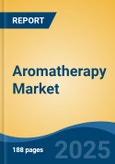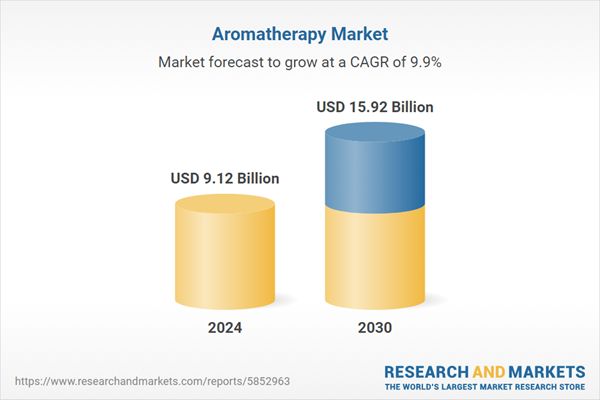Speak directly to the analyst to clarify any post sales queries you may have.
10% Free customizationThis report comes with 10% free customization, enabling you to add data that meets your specific business needs.
For instance, in November 2022, AromaEasy, a distributor of essential oils, launched an advanced aroma relaxing therapy diffuser. This innovative product features color-changing LED lights, enhancing both the visual and sensory experience for users, and supporting the growing demand for multifunctional wellness and aromatherapy solutions. Consumers are increasingly turning to these natural solutions to manage stress, anxiety, insomnia, and even certain skin and respiratory conditions. This shift in consumer behavior is fueled by a broader wellness movement that prioritizes self-care, mindfulness, and natural living. Aromatherapy products - ranging from diffusers and inhalers to massage oils and bath salts - are now widely available in both specialty stores and mainstream retail channels, including e-commerce platforms. This accessibility, combined with aesthetically appealing branding and wellness-oriented marketing, continues to drive adoption across diverse demographics.
Key Market Drivers
Rising Awareness of Natural and Holistic Therapies
Rising awareness of natural and holistic therapies has become a major force behind the growing popularity of aromatherapy across the globe. For instance, according to GWI, Brazil led the wellness economy in Latin America as of May 2024, reaching an estimated market value of around USD 96 billion, reflecting the country's strong consumer demand and investment in health, wellness, and self-care industries. Consumers are increasingly drawn to natural approaches that align with a more balanced, sustainable lifestyle. Concerns about the side effects of synthetic medications have led many individuals to explore alternative solutions rooted in nature.Aromatherapy, with its use of essential oils derived from plants, appeals to those seeking gentle, non-invasive treatments for common physical and emotional ailments. The shift toward wellness-oriented living is encouraging people to take a proactive role in their health. Aromatherapy fits well within this mindset, offering support for stress reduction, improved sleep, and emotional well-being without the need for pharmaceutical intervention.
The sensory experience of using essential oils - through inhalation or topical application - has also been linked to mood enhancement and relaxation, making it a favored tool in self-care routines. Educational content shared through social media, wellness blogs, and health influencers is playing a crucial role in spreading awareness. People are learning how specific essential oils can address particular concerns, from lavender for calming effects to eucalyptus for respiratory support. This growing knowledge is encouraging consumers to integrate aromatherapy into their daily lives.
In professional settings such as spas, yoga studios, and holistic clinics, aromatherapy is being used to complement treatments and enhance overall experiences. The preference for clean-label products and plant-based ingredients is expected to keep driving interest in aromatherapy, as consumers continue to embrace therapies that support both their health and the environment.
Key Market Challenges
Adulteration and Quality Concerns
Adulteration and quality concerns present significant obstacles to the credibility and growth of the global aromatherapy market. Essential oils, which form the core of aromatherapy products, vary widely in purity depending on their source, extraction method, and storage conditions. In many cases, oils marketed as “pure” or “natural” are diluted with cheaper carrier oils or contain synthetic additives, making it difficult for consumers to identify authentic products. This lack of transparency not only affects therapeutic efficacy but can also pose health risks. Impure or contaminated oils may trigger allergic reactions, skin irritation, or respiratory issues.Inconsistent quality undermines the trust of users who rely on aromatherapy for stress relief, relaxation, or other wellness purposes. Once negative experiences occur due to poor-quality products, consumers may be discouraged from using aromatherapy altogether. Essential oil adulteration is often driven by cost-cutting measures, especially when producers seek to offer lower prices in a competitive market. High-quality oils require significant raw material input and careful distillation, making them more expensive. Unscrupulous suppliers may compromise on purity to increase profit margins.
The problem is compounded by a lack of regulatory oversight. In many regions, there are no mandatory quality standards or testing protocols to ensure that products meet basic safety and purity benchmarks. This allows substandard oils to enter the market unchecked. For the aromatherapy industry to thrive, greater emphasis on third-party testing, transparent labeling, and consumer education is essential. Building trust through verified quality will be key to sustaining long-term growth and user confidence.
Key Market Trends
Rising Demand for Organic and Natural Products
Rising demand for organic and natural products is a major trend influencing the aromatherapy market. As consumers become more aware of the ingredients in their wellness and personal care items, there is a clear shift toward products that are free from synthetic chemicals, pesticides, and artificial fragrances. This change in preference aligns with broader lifestyle choices focused on sustainability, health, and environmental responsibility. Aromatherapy products, particularly essential oils, are closely scrutinized for their purity and origin. Consumers increasingly seek oils that are certified organic, ethically sourced, and extracted through clean methods like steam distillation or cold pressing. Brands that provide transparent sourcing information and third-party certifications are gaining consumer trust and loyalty.Natural products are often perceived as safer and more effective, especially when used for stress relief, sleep support, or skincare. People with sensitivities or allergies prefer organic options because they are less likely to cause irritation. This has expanded the appeal of aromatherapy beyond traditional users to include families, pregnant women, and individuals with chronic conditions who prioritize gentle and natural solutions. Retailers and manufacturers are responding by offering a wider range of organic aromatherapy items, from single-origin oils to pre-blended formulations designed for specific wellness goals. Clean packaging, minimalist branding, and sustainability messaging are also playing a role in marketing these products. As awareness of the potential health risks associated with synthetic ingredients continues to grow, the demand for organic and natural aromatherapy products is expected to remain strong, reinforcing this trend as a long-term driver of market growth.
Key Market Players
- doTERRA International LLC
- Young Living Essential Oils Lc
- Mountain Rose Inc
- Edens Garden Inc.
- Rocky Mountain Oils, LLC
- Plant Therapy Essential Oils
- Biolandes Inc.
- Stadler Form Aktiengesellschaft
- Hubmar International Inc.
- Ryohin Keikaku Co., Ltd.
Report Scope:
In this report, the Global Aromatherapy Market has been segmented into the following categories, in addition to the industry trends which have also been detailed below:Aromatherapy Market, By Component:
- Consumables
- Diffusers
Aromatherapy Market, By Application:
- Relaxation
- Skin & Hair Care
- Pain Management
- Cold & Cough
- Insomnia
- Others
Aromatherapy Market, By End User:
- Hospitals & Clinics
- Homecare
- Spa & Wellness Centers
- Others
Aromatherapy Market, By Region:
- North America
- United States
- Canada
- Mexico
- Europe
- France
- United Kingdom
- Italy
- Germany
- Spain
- Asia-Pacific
- China
- India
- Japan
- Australia
- South Korea
- South America
- Brazil
- Argentina
- Colombia
- Middle East & Africa
- South Africa
- Saudi Arabia
- UAE
Competitive Landscape
Company Profiles: Detailed analysis of the major companies present in the Global Aromatherapy Market.Available Customizations:
Global Aromatherapy Market report with the given Market data, TechSci Research, offers customizations according to a company's specific needs. The following customization options are available for the report.Company Information
- Detailed analysis and profiling of additional Market players (up to five).
This product will be delivered within 1-3 business days.
Table of Contents
Companies Mentioned
- doTERRA International LLC
- Young Living Essential Oils Lc
- Mountain Rose Inc
- Edens Garden Inc.
- Rocky Mountain Oils, LLC
- Plant Therapy Essential Oils
- Biolandes Inc.
- Stadler Form Aktiengesellschaft
- Hubmar International Inc.
- Ryohin Keikaku Co., Ltd
Table Information
| Report Attribute | Details |
|---|---|
| No. of Pages | 188 |
| Published | August 2025 |
| Forecast Period | 2024 - 2030 |
| Estimated Market Value ( USD | $ 9.12 Billion |
| Forecasted Market Value ( USD | $ 15.92 Billion |
| Compound Annual Growth Rate | 9.8% |
| Regions Covered | Global |
| No. of Companies Mentioned | 10 |









